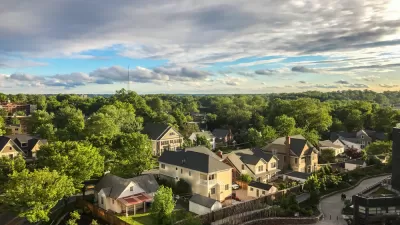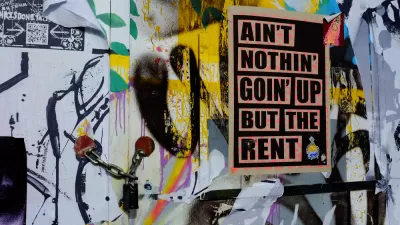Rent control is a popular response to the ongoing housing affordability crisis in many parts of the United States, but there is still a chorus of economists and planners who argue that rent control can do more harm than good to housing affordability.

Bill Lindeke writes for the twin cities sidewalks blog to make the case that the Housing Equity Now Saint Paul (HENS) rent control proposal, which would cap rent increases at 3 percent annually, would stop new housing from being built—a "de facto ban on housing," as it's described here.
Earlier this month, Lindeke reported for the MinnPost that St. Paul voters are faced with the prospect of approving the country's most aggressive rent control policy in the November election. To recap the summary of the HENS proposal provided in that article:
The law would cap rent increases for all of the city’s 65,000 rented homes at 3% per year, but includes a complicated list of factors that allow landlords to apply for a variances — things like property taxes, maintenance issues, capital improvements (only if needed to bring a building to code), and a few others. The process for applying for the variances is yet to be determined. The ordinance exempts only subsidized housing from the caps.
In the blog post for twin cities sidewalks, Lindeke explains that the question that keeps coming up since the MinnPost article is as follows: "Why does a 3% rent cap stop new housing from being built?"
Lindeke's answer, which you should click through below to read in full, hinges on
- The difference between landlords and developers: "3% is usually fine for a landlord but a huge limit for someone leasing out a new building."
- Inflation: "If inflation is close to or higher than 3%, you're just plain screwed. Not only can’t you move rents around to fill a building, you're actually forced to lower rents in real dollars."
The 3 percent cap on rent therefore, according to Lindeke, "greatly increases the risk of loans for new housing construction."
FULL STORY: Why the 3% Rent Cap Stops New Housing Construction

Study: Maui’s Plan to Convert Vacation Rentals to Long-Term Housing Could Cause Nearly $1 Billion Economic Loss
The plan would reduce visitor accommodation by 25,% resulting in 1,900 jobs lost.

North Texas Transit Leaders Tout Benefits of TOD for Growing Region
At a summit focused on transit-oriented development, policymakers discussed how North Texas’ expanded light rail system can serve as a tool for economic growth.

Using Old Oil and Gas Wells for Green Energy Storage
Penn State researchers have found that repurposing abandoned oil and gas wells for geothermal-assisted compressed-air energy storage can boost efficiency, reduce environmental risks, and support clean energy and job transitions.

Private Donations Propel Early Restoration of Palisades Playground
Los Angeles has secured over $1.3 million in private funding to restore the Pacific Palisades playground months ahead of schedule, creating a modern, accessible space that supports community healing after recent wildfires.

From Blight to Benefit: Early Results From California’s Equitable Cleanup Program
The Equitable Community Revitalization Grant (ECRG) program is reshaping brownfield redevelopment by prioritizing projects in low-income and environmental justice communities, emphasizing equity, transparency, and community benefits.

Planting Relief: Tackling Las Vegas Heat One Tree at a Time
Nevada Plants, a Las Vegas-based nonprofit, is combating the city’s extreme urban heat by giving away trees to residents in underserved neighborhoods, promoting shade, sustainability, and community health.
Urban Design for Planners 1: Software Tools
This six-course series explores essential urban design concepts using open source software and equips planners with the tools they need to participate fully in the urban design process.
Planning for Universal Design
Learn the tools for implementing Universal Design in planning regulations.
Ascent Environmental
Borough of Carlisle
Institute for Housing and Urban Development Studies (IHS)
City of Grandview
Harvard GSD Executive Education
Toledo-Lucas County Plan Commissions
Salt Lake City
NYU Wagner Graduate School of Public Service





























